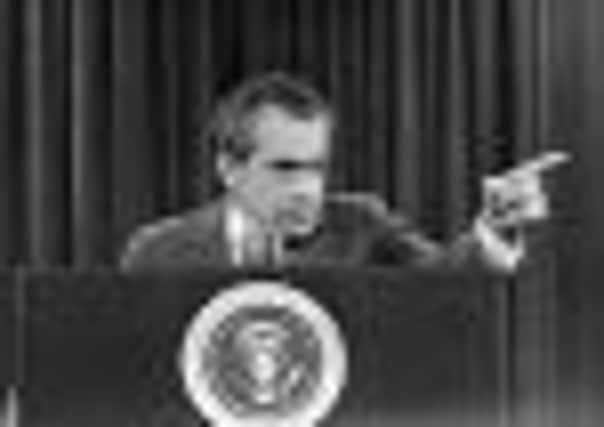Gerald Warner: From wire-taps to phone hacks – from Watergate to Leveson


It was on 17 June, 1972 that five politically motivated burglars were arrested at the Democratic National Committee’s headquarters in the Watergate complex in Washington as they tried to plant wiretaps. At the time, it was a relatively low-key dirty-tricks operation by one political party against another; on 7 November Richard Nixon was re-elected president in one of the biggest landslides in American history; by the end of January 1973 the burglars were in prison. Only on 9 August, 1974, did the Watergate war of attrition finally remove Nixon from office.
The historical irony is that Nixon was personally innocent as regards the Watergate break-in. The same evidence that convicted him of participation in the subsequent cover-up revealed a baffled President, six days after the break-in, angrily demanding of H R Haldeman: “Who was the ***hole that did it?” As the investigation took on a life of its own, it ended with the only US presidential resignation ever and 43 people in prison. Just as it was the aftermath rather than the original crime that precipitated such huge consequences, Watergate has always loomed larger in mythology than in sober history. Nowhere was that tendency more pronounced than among the journalistic profession.
Advertisement
Hide AdAdvertisement
Hide AdNever coy about blowing their own trumpet and uniquely equipped with the means to do so, the mass media created a myth around Bob Woodward and Carl Bernstein, the Washington Post reporters who investigated Watergate. They were invested with a heroic aura that only dimmed after the passage of many years and reassessments of their role, notably the fact that their chief informant, nicknamed “Deep Throat”, turned out to be an associate director of the FBI who had been passed over for the directorship. At the time, however, their revelations put a patina of glamour on their profession so that applications for journalism schools reached a record high in 1974: hacks occupied the place in public esteem post-Watergate that New York firemen enjoyed post-9/11.
Today, in Britain, the 40th anniversary of Watergate is overshadowed by the Leveson inquiry, but this time it is the press that are in the dock. The two events are remotely linked: they are opening and closing brackets forming a parenthesis around 40 years of licensed media irresponsibility. The self-serving mantras of “the People’s right to know” and the so-called “public interest” became the justificatory litany for ever more intrusive harassment of individuals and extravagantly propagandist bias in news coverage. The Watergate affair was indefensible. Yet there was truth in Nixon’s claim that if he had been following the liberal agenda the media preferred, “Watergate would have been a blip”.
That theory can be tested by contrasting his experience with the indulgent treatment of Bill Clinton’s impeachment by a liberal-dominated media. Regardless of the fact that the Democrats had their own plans to feed disinformation to Nixon, Watergate established an image of conservative politics as immoral and liberal politics as squeaky-clean. The media prejudice in favour of liberalism awarded the Democrat Party – after Hollywood, the main motor of degeneracy in America – a spurious moral credibility, for those whose stomachs are strong enough for the spectacle of fanatical defenders of partial-birth abortion occupying the moral high ground.
It was for that partisan reason Watergate failed to become the cathartic agent it might have been for redefining the political class as synonymous with the criminal class – an axiom increasingly acknowledged here in the wake of the MPs’ expenses scandal, one of the few occasions when the media lived up to their pretensions to champion the public interest. The Watergate investigation’s ultimate contribution to the public interest was to give America and the world the presidency of Jimmy Carter.
The unction of priesthood with which journalists were anointed in the wake of Watergate has been washed away by Leveson and associated issues. That is a healthy development. A realistic assessment of history since the middle of the 18th century – earlier in Britain – shows that any crime, delusion or disaster that was not inflicted on society by politicians was brought about by the Fourth Estate. It was vile and pornographic pamphleteering in pre-revolutionary France that alienated a gullible public from the monarchy and led to the Terror and the bloodletting of the Napoleonic Empire.
Liberty of the press was subsequently turned into a maxim of “democracy” despite the manipulative power that notion confers on an oligarchy. Without the sabre-rattling of newspapers promoting conflicting jingoisms the First World War might have been averted. Politicians and propagandists are the symbiotic subverters of civilisation.